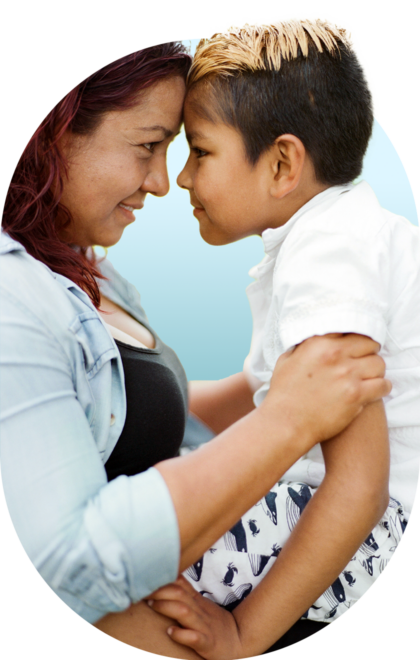
General Late Effects
Pediatric brain tumors can have a lasting impact on a child long into survivorship. Late effects depend on where the tumor was located and what kind of treatment the child received. It is important for survivors and families to know what to watch for and what to do.
Types of Late Effects and What to Do
Alopecia
Alopecia is the medical word for hair loss. Radiation to the head and scalp causes hair loss beginning soon after the start of treatment. Hair will regrow if the hair follicles are not permanently damaged, but long-lasting hair loss often happens after high doses of radiation.
What You Can Do About Alopecia
Loss of hair from just part of the scalp can sometimes be made less noticeable with creative hairstyles. If you have long-term hair loss, you may feel more comfortable using scarves, hats, or wigs. Unfortunately, there’s not really any evidence that special diets or shampoos are effective.
Cataracts
Cataracts happen when the lens in the eye becomes cloudy after being exposed for many years to the sun’s ultraviolet light. This is a normal part of getting older, and cataracts usually don’t get bad enough to affect a person’s vision until after the age of 70. But for survivors of brain tumors, radiation and steroids like dexamethasone (Decadron) can speed that aging process in the eye and cause cataracts to form at younger ages.
What You Can Do About Cataracts
Have an eye exam each year by an eye doctor. Wear sunglasses outside to prevent more damage to the lens of the eye.
Sinus Problems
Bony structures inside the sinus cavities (spaces in your head behind your nose and eyes) can be damaged by radiation and that can keep the sinuses from draining properly. This can cause a runny nose that won’t stop, chronic post-nasal drip, and lots of sinus infections.
What You Can Do About Sinus Problems
Over-the-counter antihistamine (a medicine that helps with sneezing and runny nose) may help. Your healthcare provider may order a CT scan of the sinuses and suggest that you see an ear, nose, and throat (ENT) specialist to talk about options.
Tooth Problems
Radiation that’s given to the whole brain or upper neck can affect the salivary glands. These glands are located on both sides of the face in front of the ears, and under the chin. Saliva from these glands helps keep the mouth moist, and that helps prevent tooth decay. Children who get radiation at a younger age may also have problems with the way their adult teeth develop. Problems can include teeth with abnormal shapes and enamel, short tooth roots, and more cavities.
What You Can Do About Tooth Problems
Make sure you have good dental hygiene habits, which include brushing your teeth at least twice a day and flossing daily. You should see your dentist for an exam, cleaning, and fluoride treatment every six months. Saliva substitutes can help relieve dry mouth symptoms.
Heart Problems
Radiation that targets the spine can sometimes have an effect on the heart. Conventional radiation (the most common kind of radiation, instead of proton radiation) can spread out from the targeted area. This is called scatter radiation. Survivors who got spinal radiation may have gotten some scatter radiation to the heart.
The amount of radiation to the heart is usually much lower than to the spine, but even a small amount of radiation can sometimes damage the heart muscle.
The effects on the heart can show up many years after treatment ends. If treatment included chemotherapy as well as radiation, the chance goes up of having blood clots and angina-like pain (chest pain, often felt when you exercise). Some chemotherapy drugs can also cause heart problems.
What You Can Do About Heart Problems
Living a healthy life can lower the chances of heart problems. Stay at a healthy weight, exercise several times each week, eat a healthy diet, and don’t smoke. You should also keep track of blood pressure and cholesterol (a kind of fat in the blood that can cause heart problems if there’s too much of it) and get treatment for high blood pressure or high cholesterol if you have them. Every few years, you should also have an echocardiogram (a test that looks at how well the heart is working).
Skeletal Problems
Radiation may keep bones from growing to their full size. This happens most often to survivors if they got radiation to their spine before they finished growing as a teenager. If the spine stops growing, the top half of your body ends up shorter than it would have been without treatment. It’s also possible that after radiation, a survivor’s spine won’t grow straight. When your spine doesn’t grow straight but grows with an abnormal curve, it’s called scoliosis. This is most likely to happen when you have a growth spurt, usually during puberty.
What You Can Do About Skeletal Problems
If your spine curves, you should see an orthopedic surgeon who is an expert in care of the spine. Treatment can be as simple as wearing a brace to help your spine grow straight, or you might need surgery to straighten the bones of the spine and keep the scoliosis from getting worse.

